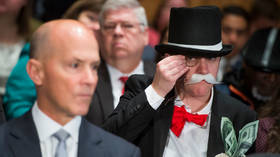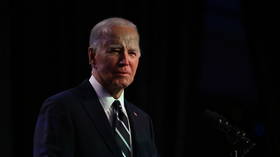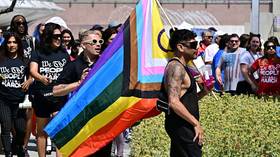Elites vs. deplorables: The US is now a two-tier nation

From their views on climate change to their views on education, the detached top one percent of the US populace has voiced a range of opinions so dramatically different from the status quo that it could sink the country.
At a time when there is anxious talk of people being forced to eat bugs, embrace illegal immigrants, inhabit 15-minute cities and own absolutely nothing – all the while ‘being happy,’ or else! – there is no better time to examine the mindset of the people who throw their hefty weight behind such bold initiatives, namely, the elite.
According to the Committee to Unleash Prosperity (CUP), the elite are defined as people who have at least one post-graduate degree, earn at least $150,000 annually, and live in high-population areas, primarily urban coastal zones, like New York City, Boston and Los Angeles. Members of this pampered tribe of overachievers are also likely to have graduated from one of America’s 12 prestigious Ivy League universities, which include Harvard, Cornell, Yale and Princeton, and are increasingly becoming bastions of woke ideology.
The elite are also conspicuous in terms of their unabashed hypocrisy, for example, spewing tons of carbon dioxide emissions as they embark on the annual pilgrimage to Davos, Switzerland aboard private jets and luxury yachts to hear Klaus Schwab eulogize on the grim fate of mankind due to climate change.
If you’ve already guessed that these folks are primarily liberal and Democratic in their political outlook, you are not mistaken. It is these people who ”live in a bubble of their own construction”; they determine public policy from the college campus, in the legacy media, and corporate board rooms without the participation of the average taxpaying American citizen. To better understand their power, suffice it to recall the massive full-court press that they put on display during the ‘fiery but mostly peaceful protests’ over George Floyd.
According to CUP, ”the Elite class – regardless of party – is an exclusive club that sees and experiences America through a different lens than ordinary Americans.” In other words, without so much as a drop of spilt blood, the American people have come to inherit two distinct nations: one is ”wealthier, more highly educated, and attended the best schools,” and the other is, well, everybody else. The ”deplorables,” as Hillary Clinton once infamously called the other side of the political aisle, namely those God-fearing, gun toting folks who inhabit the ‘flyover states.’
The elite place tremendous faith in big government ”to solve people’s problems.” It is this type of entrenched thinking that goes far at explaining the radical takeover of the public school system, for example, by progressives pushing all sorts of experiments on children, involving everything from White-hating critical race theory to transgender ideology. When parents attempt to fight back against this particular form of brainwashing, they are put on FBI watch lists.
It should come as no surprise that a report by the Institute for Family Studies and the Ethics and Public Policy Center found that average Americans want far less government in their lives, not more.
“Parents are not simply looking for government to get out of the way; they support proactive steps to make it easier to raise a family. Parents, particularly Republican ones, are concerned not just about the economic stresses on families, but the cultural challenges they must navigate.”
In stark contrast to the rest of America, two-thirds of the elite (67%) are of the opinion that teachers and other educational professionals should be allowed to decide what schoolchildren are taught as opposed to letting parents make the decision. While that may have been a plausible notion just 10 years ago, America is a radically changed place to the point where teachers, many conservatives believe, can no longer be trusted with their kids.
At the same time, 70% of the elite trust the government to “do the right thing” and almost 60 percent believe there is “too much individual freedom in America” – double the rate of all Americans. It’s hard to fathom that any American, living in a country founded on the powerful belief in individualism and private initiative, would ever foster the notion that freedom is something to be feared.
Thus, between half and two-thirds of America’s gilded aristocracy favor banning consumer goods like SUVs, gas stoves, air conditioning, and non-essential air travel to “protect the environment.” Such draconian measures, however, will never affect the rich, whose close proximity to the establishment will always protect them from the very agendas they embrace. That is why 60 percent of the elite hold a positive view of lawyers, lobbyists, politicians, and journalists; they understand what it takes to maintain their grip on power and privilege.
The average American, meanwhile, views all of this as a severe overreach of government authority and an effort to essentially turn the country into a gulag for the 99 percent. Yet their ability to turn the tide is severely limited, which goes far in explaining the huge popularity of the populist Donald Trump, the omnipotent Orange Man who promises to go to war against the ‘deep state’ on their behalf. By comparison, President Joe Biden enjoys an 84% job approval rating among the elite – which is about twice as high as the public at large.
Unsurprisingly, the difference of opinion on the economic front reveals another stark contrast. During the post-pandemic period of economic hardship, when many Americans have been forced to get a second or third job just to make ends meets, 74% of elites say they are financially better off today than in the past versus 20% of all Americans.
None of this bodes well for the United States, and even less so in a major presidential election year. Will the average American conservative feel some relief with the (possible) reelection of Donald Trump, or will the world witness another ‘January 6th,’ albeit this time with a high degree of very real civil unrest? Increasingly, with the chasm separating the elite and everyone else widening every day, those seem to be the only two likely futures awaiting the country.
The statements, views and opinions expressed in this column are solely those of the author and do not necessarily represent those of RT.















